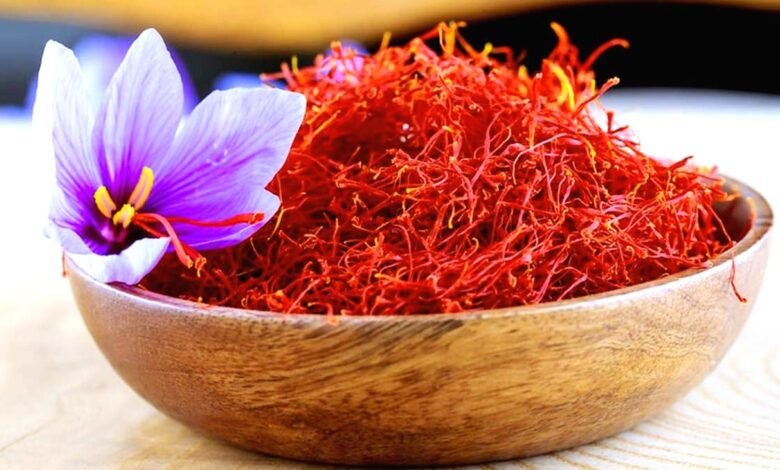11 Benefits of Saffron for Optimal Health: According to Nutritionist

Saffron, often hailed as the “sunshine spice,” is more than just a culinary delight. Its journey from the vivid fields of Crocus sativus flowers to our kitchens is rich in history. It has a variety of health advantages that go beyond its aromatic and flavorful qualities. In this exploration, we’ll uncover the benefits of saffron contributing to our well-being.
Historical Significance of Saffron
To truly understand saffron’s significance, we must rewind to ancient civilizations, where it was revered not only for its distinct taste but also for its perceived medicinal properties. From the ancient Egyptians, who used saffron in their concoctions, to the Greeks and Romans, who considered it a symbol of wealth, saffron’s journey is interwoven with cultural and historical significance. Its roots in traditional medicine highlight its long-standing reputation as a holistic healer.
Benefits of Saffron for Optimal Health
1. Nutritional Composition
Beyond its exquisite flavor, saffron boasts a rich nutritional profile. Packed with essential vitamins, minerals, and antioxidants, it stands as a valuable addition to any well-balanced diet. From riboflavin and niacin to manganese and iron, saffron contributes not only to taste but also to the body’s overall health.
2. Antioxidant Properties
The vibrant hue of saffron is a testament to its powerful antioxidants. These compounds play a vital role in neutralizing free radicals, unstable molecules that can cause cellular damage. By reducing oxidative stress, saffron aids in preventing a range of health issues, from premature aging to chronic diseases.
3. Anti-Inflammatory Benefits
Inflammation, though a natural response, can become a silent adversary, leading to various chronic conditions. Saffron’s anti-inflammatory properties have been studied for their potential to mitigate inflammatory processes, making it a valuable ally in the fight against arthritis, cardiovascular issues, and other inflammatory disorders.
4. Mood Enhancement
Beyond its culinary uses, saffron has been linked to mood enhancement. Active compounds in saffron have been found to influence neurotransmitters like serotonin, potentially offering a natural remedy for stress and anxiety. Including saffron in your diet could be a flavorful way to uplift your spirits.
5. Cognitive Health
Research suggests that saffron may play a role in supporting cognitive health. Its compounds, such as crocin and safranal, have demonstrated neuroprotective effects, potentially aiding in memory retention and cognitive function. Embracing saffron in your diet might be a delicious strategy to boost brain health.
6. Heart Health
The benefits of saffron extend to cardiovascular health. Regular consumption has been associated with lowered blood pressure and cholesterol levels, contributing to a healthier heart. These cardiovascular advantages position saffron as a flavorful addition to heart-conscious diets.
7. Weight Management
For those on a journey toward healthier living, saffron might be a hidden gem. Studies suggest its potential for appetite control, which can be instrumental in weight management. Including saffron in your meals not only enhances flavor but also aids in mindful eating.
8. Vision Improvement
Saffron isn’t just a treat for the taste buds; it’s a boon for your eyes, too. Research indicates its potential to prevent age-related macular degeneration and promote overall eye health. By incorporating saffron into your diet, you’re not just savoring flavor but also nourishing your vision.
9. Anti-Cancer Properties
While ongoing research is needed, early studies suggest that saffron may possess anti-cancer properties. Compounds like crocin and safranal exhibit anti-tumor effects, making saffron a promising candidate for natural cancer prevention.
10. Digestive Health
Saffron emerges as a friend for your digestive system. From soothing digestive issues to promoting healthy gut flora, it contributes to overall digestive wellness. Including saffron in your culinary repertoire is not just a treat for your taste buds but also a gesture of kindness to your digestive tract.
11. Skin Benefits
Saffron’s benefits transcend internal health; they extend to your skin. Its anti-aging properties can be harnessed for a radiant complexion. Whether applied topically or included in your diet, saffron becomes a beauty elixir, contributing to youthful and glowing skin.
Related: Health Benefits of Green Tea: Tips for Brewing a Healthy Cup
The Best Ways to Consume Saffron for Maximum Benefits
Saffron, often referred to as the “sunshine spice,” not only adds a distinctive flavor to dishes but also comes with a host of health benefits. To harness the full potential of saffron, consider incorporating it into your routine in various ways:
Saffron-infused water:
- Begin your mornings with a refreshing glass of saffron-infused water. Soak a few strands of saffron in warm water and allow it to steep. This hydrating elixir not only tastes delightful but also kickstarts your metabolism.
Saffron Tea:
- Create a soothing saffron tea by adding a pinch of saffron threads to hot water. Let it steep for about 15 minutes, allowing the saffron to release its flavor and color. Strain and customize with honey or a slice of lemon for added taste.
Saffron Milk:
- Enjoy the calming benefits of saffron by infusing it into warm milk. This age-old remedy not only aids in relaxation but also contributes to better sleep. Add a touch of sweetness with honey if desired.
Saffron Smoothies:
- Boost the nutritional content of your smoothies by incorporating saffron. Blend saffron with your favorite fruits, yogurt, and a drizzle of honey for a delicious and health-packed beverage.
Saffron Rice Dishes:
- Elevate the flavor and visual appeal of your rice dishes by incorporating saffron. Soak saffron strands in warm water and mix them into the rice before cooking. This technique is particularly effective in dishes like biryanis.
Saffron-infused oil:
- Create a gourmet saffron-infused oil by steeping saffron strands in olive oil. This aromatic oil can be used in salad dressings or drizzled-over dishes for an added layer of flavor.
Saffron Desserts:
- Explore the sweet side of saffron by incorporating it into desserts. From saffron-infused custards to rice puddings, this spice adds a unique and luxurious touch to your sweet indulgences.
Saffron Supplements:
- If you prefer a more concentrated form of saffron, consider saffron supplements. These are available in various forms, such as capsules or tinctures. However, it’s crucial to consult with a healthcare professional before adding supplements to your routine.
Saffron Facial Masks:
- Leverage saffron’s antioxidant properties for your skin by creating a face mask. Combine saffron with honey or yogurt to make a natural mask that promotes a glowing complexion.
Saffron in Soups:
- Add saffron to your favorite soups to impart both flavor and health benefits. Its distinctive taste can complement a variety of savory dishes, enhancing the overall culinary experience.
Saffron in Broths:
- Enhance the nutritional value of broths by infusing them with saffron. The warm and comforting notes of saffron make this a delightful addition, especially during the colder seasons.
Saffron Lemonade:
- Create a refreshing saffron lemonade by combining saffron-infused water with freshly squeezed lemon juice and a touch of sweetener. This beverage not only quenches your thirst but also provides a unique twist to a classic drink.
How to Incorporate Saffron into Your Diet
Integrating saffron into your culinary routine is a delightful endeavor. From savory dishes like paella and biryani to sweet treats like saffron-infused desserts, there are numerous ways to enjoy its unique flavor. Consider infusing rice, tea, or even soups with saffron to elevate your culinary experience.
Saffron Milk Recipe
Ingredients:
- 1 cup of milk
- A pinch of high-quality saffron threads
- 1-2 tablespoons of sugar (adjust to taste)
- 1/4 teaspoon of ground cardamom (optional)
- Chopped nuts for garnish (almonds, pistachios)
Instructions:
- Warm the milk:
- Pour the milk into a saucepan and warm it over medium heat. Be careful not to boil it; you want it warm enough to infuse the saffron.
- Prepare Saffron:
- Take a small bowl and add a pinch of saffron threads. You can crush them slightly with your fingers to release more flavor and color.
- Infuse Saffron:
- Add a tablespoon of warm milk to the saffron in the bowl. Allow it to soak for about 10–15 minutes. This process, called blooming, enhances the saffron’s flavor and imparts a beautiful golden hue to the milk.
- Combine milk and saffron:
- Pour the saffron-infused milk back into the saucepan with the rest of the warm milk. Stir gently to combine.
- Add Sugar:
- Adjust the sweetness according to your preference by adding sugar. Stir well until the sugar dissolves completely.
- Optional: Cardamom for Flavor:
- For an extra layer of flavor, you can add a pinch of ground cardamom to the saffron milk. Cardamom complements saffron beautifully.
- Simmer and strain (optional):
- If you like a smoother texture, you can simmer the saffron milk for a few minutes. Strain it before serving to remove any saffron threads or coagulated bits.
- Serve Warm:
- Pour the saffron milk into your favorite cup or mug. Garnish with chopped nuts like almonds or pistachios for added texture and visual appeal.
- Enjoy:
- Savor the rich, aromatic saffron milk. It’s not just a treat for your taste buds, but also a comforting and soothing beverage.
This saffron milk is not only delicious but also carries the health benefits of saffron, making it a perfect bedtime drink or a luxurious treat on a chilly evening. Enjoy the warm embrace of this golden elixir!
Conclusion
In conclusion, saffron is not merely a spice but a holistic wellness companion. From its rich historical tapestry to the vast array of health benefits it offers, saffron stands as a testament to nature’s power to nurture. As you embark on a journey to better health, consider inviting saffron to your table and letting its flavors and benefits weave seamlessly into your lifestyle.
FAQs (Frequently Asked Questions)
- Can saffron be consumed daily?
- Yes, in moderation. It’s advisable to consult a healthcare professional if you have specific health concerns.
- Are there any side effects of saffron?
- While generally safe, excessive consumption may lead to side effects. It’s crucial to follow the recommended guidelines.
- Can saffron help with depression?
- Some studies suggest saffron’s potential for managing mild to moderate depression, but professional advice is essential.
- Is saffron suitable for pregnant women?
- Pregnant women should consult their healthcare provider before incorporating saffron into their diet.
- How do I store saffron properly?
- Store saffron in a cool, dark place in an airtight container to maintain its flavor and potency.











